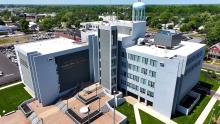By
on

A recent editorial in the Boston Globe caught my attention - Fiber-optic nerve. It seems that Boston is tired of waiting for private companies to build modern broadband networks in the city.
The editorial suggests that as Verizon has started building its FTTH FiOS in New York City, D.C., and some of the Boston suburbs, it may be a withholding the network from Boston due to the Mayor's efforts to change a state law that has exempted telecom companies from paying a number of taxes. Verizon denies any connection. From the editorial:
Menino is right to insist that telecommunication companies pay their fair share of taxes. In Boston, the exemption shifts more than $5 million a year onto the property tax bills of homeowners, say city officials. But tensions between Verizon and the mayor can be costly in many ways. City cable providers Comcast and RCN, for example, don’t offer the speedier fiber-optic connections into customers’ homes available from Verizon in 98 Massachusetts cities and towns. The new and faster broadband speeds - both downstream and upstream - offered by Verizon to Internet customers therefore remain beyond the reach of Bostonians, as do FiOS-related incentives on products such as mini netbooks and camcorders. Cable and Internet competition is alive and well in the suburbs, but flat in Boston.Verizon has previously threatened to withhold its investments in states that do not sufficiently deregulate -- after turning its back on the New England region by offloading its customers on the totally unprepared Fairpoint company, Verizon pushed franchise "reform" in Massachusetts. Franchise "reform" is when states agree to preempt local communities that selfishly want to regulate the quality of service offered by providers - things like requiring some local channels and thresholds for customer service. As Karl Bode noted in the link above:
While these bills are promoted as a magic elixir that will bring competition and lower TV prices to a region, when people go back to investigate whether these bills actually helped anybody (which is amusingly rare), data indicates that TV prices increased anyway and consumers got the short end of the stick. State lawmakers are usually no match for Verizon and AT&T lobbying muscle. Legislators frequently don't understand what the bills even do -- but are easily lured by promises of inexpensive TV service that never comes.What I find most interesting is the apparent belief of Bostonians that Verizon is under some obligation to save their fair city from the under-investment of its existing providers. Verizon is under one obligation - to maximize returns for its shareholders. If they decide to invest in Boston, so be it. But their first priority is always shareholders, not what is best for a community. As for Boston, it is up the City to make sure it is making the necessary investments to ensure they can thrive. Large cities have been loathe to invest in the fiber networks that smaller cities like Lafayette, LA and Chattanooga, TN have committed to. Time will tell if Boston's beggar-strategy will succeed. Meanwhile, in another part of the state, OpenCape is moving ahead with middle mile plans to build the networks they need. OpenCape is a nonprofit:
OpenCape Corporation’s purpose is to fulfill the need for a regional communications network on Cape Cod and the Islands to enhance education, research, and economic development, AND provide for an emergency communications network in times of crisis.
Geoterm







